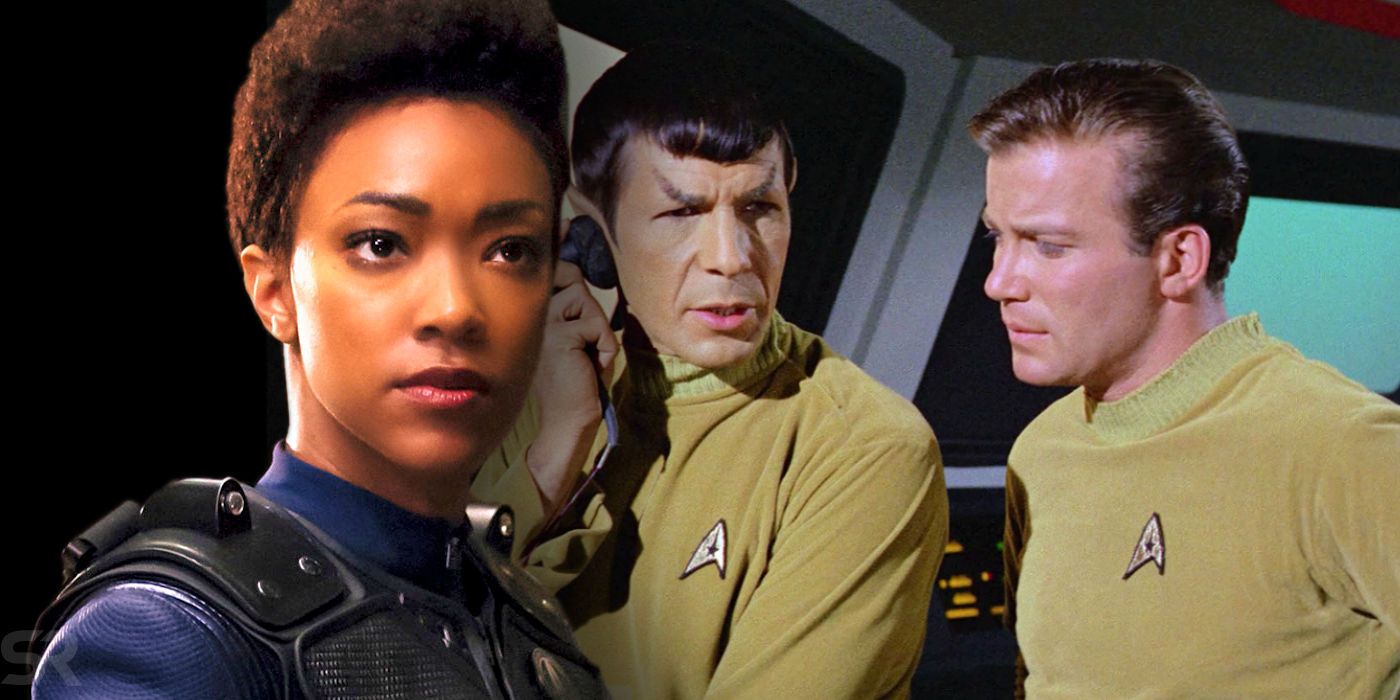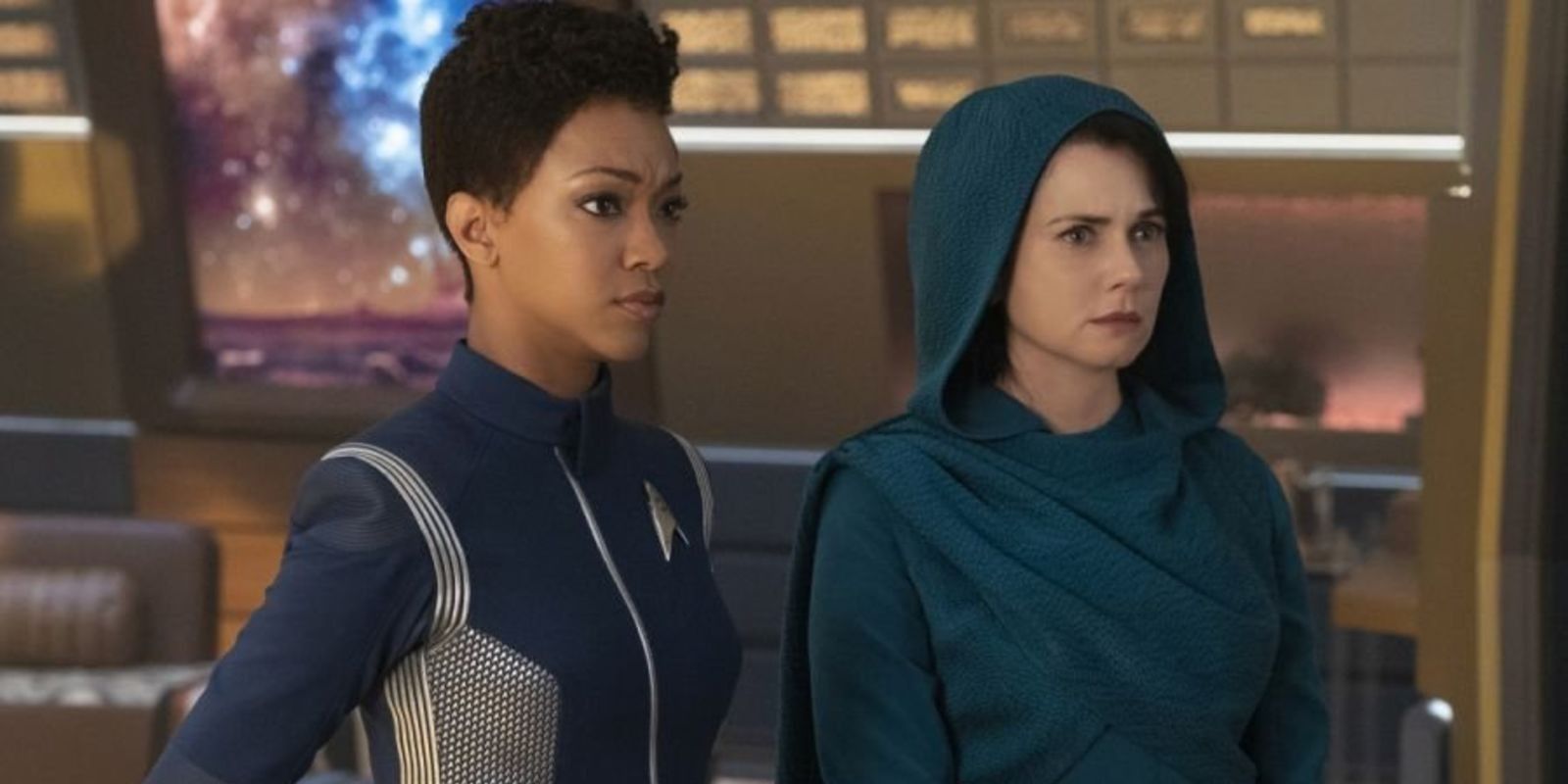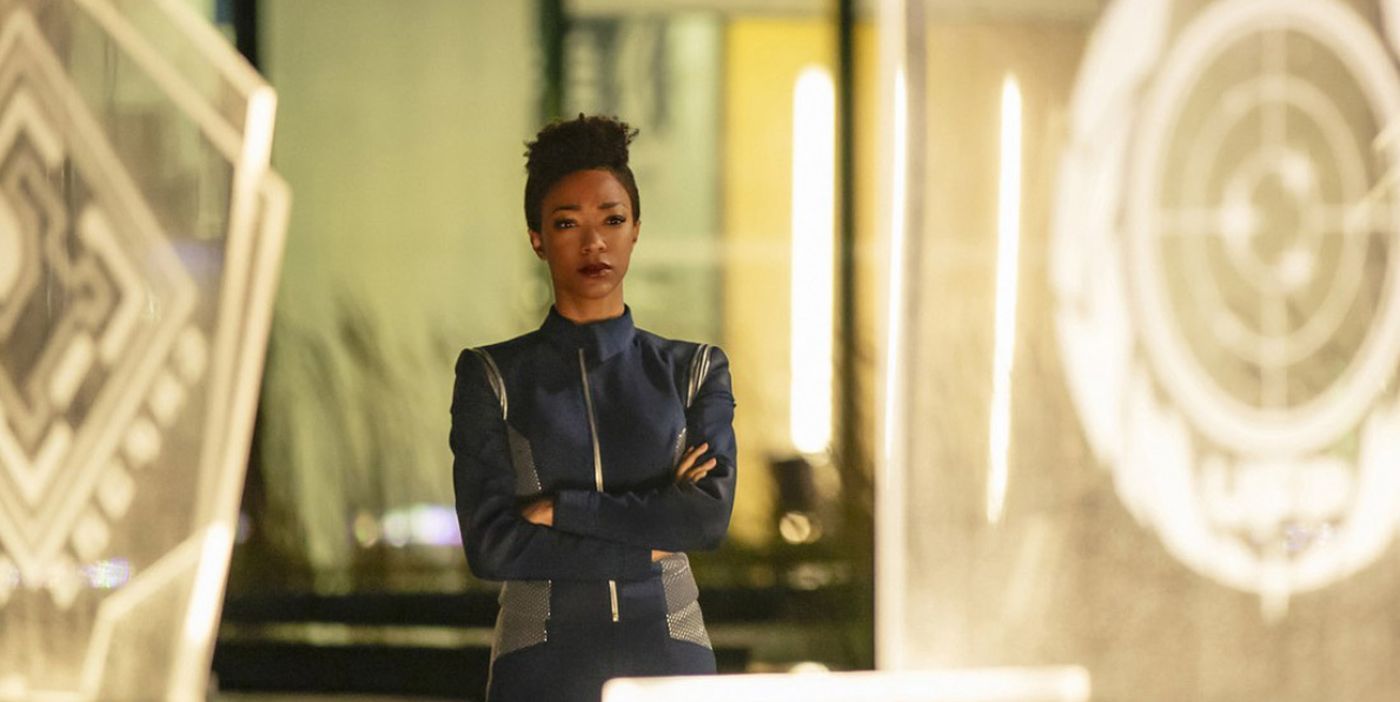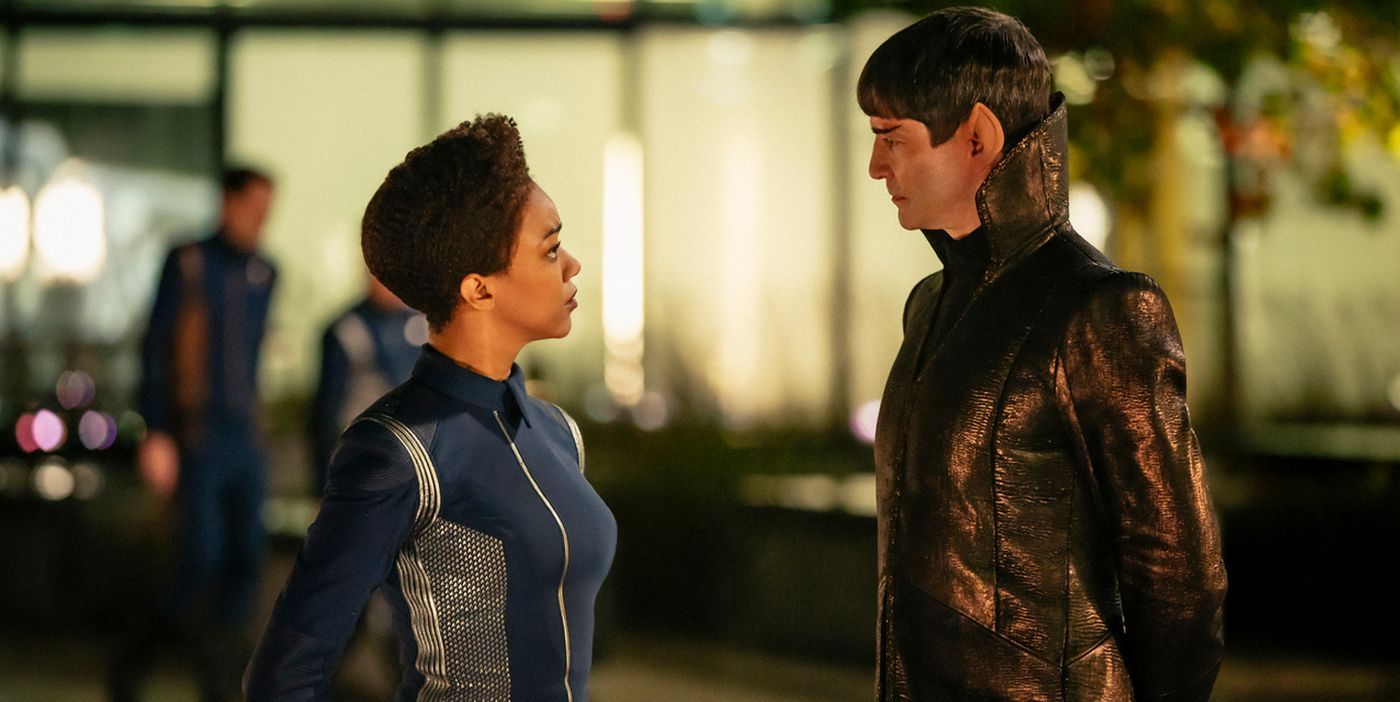Star Trek: Discovery's need to make all things revolve around Michael Burnham and her family is not only hurting the show, but the larger Star Trek canon as well. Season 2 of the CBS All Access series has been met with a decidedly warmer reception than the polarizing season 1. Star Trek: Discovery season 2 has not only left the bloody Klingon war behind, it's embraced its ensemble, making the show feel more like a traditional Star Trek adventure with character specific episodes and an overall sense that everyone matters.
Season 2 has included excellent meditations on core cast members like Saru, Tilly, and Stamets, as well as more minor characters like Airiam. Anson Mount's Captain Christopher Pike has proved to be a sort of soothing balm, the morally pure leader the show lacked in its first season - though it'll have to manage without him soon, as Mount will not be back for season 3. Yet there has still been the inescapable feeling that season 2's overall arc would come back to Micheal Burnham, and the episode "The Red Angel" confirmed that suspicion, and then some. Burnham's role in the time traveling, humanity threatening plots of season 2 transcend the usual importance of Star Trek leads, and pushes the character into the realm of a science fiction "chosen one," a genre trope Star Trek has generally avoided.
Related: Star Trek: Discovery Is Close To Repeating The Mistakes Of Season 1
What are audiences to make of Star Trek: Discovery and Burnham if every season ends with her at the center of a universe defining crisis, coupled with the fact that she's never been mentioned before in Star Trek fiction, not even by her adoptive brother Spock? Is this just the inevitable price of telling stories through prequels, or a bigger issue at the heart of the series that could have wide ranging ramifications for the franchise?
- This Page: The Discovery Writers Keep Failing Michael Burnham
- Page 2: Burnham's Absence From Federation History Is Getting Dubious
The Discovery Writers Keep Failing Michael Burnham
On paper, Michael Burnham is a fascinating character. Sonequa Martin-Green is an acting heavyweight more than up to the task of headlining a Star Trek series, and the notion of a disgraced Starfleet officer reluctantly looking for redemption is an intriguing one - just as it was when Star Trek: The Next Generation used a similar setup for Ensign Ro. The original problems with Burnham arose when the decision was made to make her Spock's never-before-mentioned adopted sister, immediately painting the character into a very specific corner. Those problems only worsened during season 1 when it became apparent that Burnham was the key to Gabriel Lorca's scheme to conquer the Mirror Universe Terran Empire, and her eleventh hour turn as Starfleet's conscience in an effort to prevent the destruction of the Klingon homeworld.
Season 1's laser focus on Burnham came at the detriment of the rest of the supporting cast, who came off more like a collection of sidekicks than a starship crew. Season 2 seemed to realize this and made a conscious effort to more fully explore the supporting cast, and while Burnham remained the show's lead character, she felt much more like a member of the crew. But that feeling began to unravel with the arrival of Spock, with Burnham once again framed as a singular savior, the only person who could restore Spock's mind and clear him of murder. The revelations in "The Red Angel" - that the increasingly problematic Section 31 was responsible for the apparent death of Burnham's parents, and that her mother is in fact the time traveling Red Angel and the key to saving all organic life in the universe from Control - takes the "chosen one" tropes of season 1 to an entirely new level, with the Burnhams suddenly feeling a lot like the Skywalkers.
Related: Did You Catch Star Trek: Discovery's Futurama Reference?
Why the series' writers would choose this path after the early season course correction is baffling, and suggests a serious lack of self-awareness. A common criticism of the first season was that the writers didn't seem all that interested in making a Star Trek show, but rather a show that grafted elements of other genre shows onto the skeleton of Star Trek. The season 1 showrunners - Aaron Harberts and Gretchen Berg - were dismissed midway through production of season 2 for allegedly abusive behavior, replaced by current Star Trek head honcho Alex Kurtzman. Perhaps the production changes simply came too late in the game to completely alter the trajectory of the season established by Harberts and Berg, but the results have featured the same distinct flavor of season 1's Mirror Universe revelations.
Page 2 of 2: Burnham's Absence From Federation History Is Getting Dubious
Burnham's Absence From Federation History Is Getting Dubious
Apart from the fact that Star Trek: Discovery's obsession with Burnham is hurting the series in the short term, it's starting to create a strain on Star Trek canon. Michael Burnham, at this point, should be a pivotal figure figure in the history of the Federation. She sparked a war with the Klingons, became infamous as Starfleet's first mutineer, then played a direct hand in ending the war; the Red Angel revelations make it even more likely she'd be a prominent figure in Federation history books. There was the suggestion during season 1 that much of what happened on the Discovery was top secret and would not be known to the general public, but the events of the series so far are much too wide ranging to not be common knowledge at least among Starfleet personnel. She should probably be mentioned in the same breath as Jonathan Archer or James Kirk as a giant of Federation history at this point.
It's also becoming more difficult to believe that neither Spock nor Sarek ever spoke of Burnham before. It's becoming clearer with every episode that Burnham wasn't just Sarek's ward, but a full fledged member of the family who had a profound effect on Spock's worldview; Burnham ultimately became one of the most crucial elements in Spock's decision to repress his human heritage and live his life as a Vulcan. That he would never mention his human sister to Kirk or McCoy over the decades seems decidedly out of character - give or take a Sybok.
Related: The Reason The Enterprise Missed Discovery's Klingon War is Pure Star Trek
Perhaps even more so than Spock's silence on the matter, Sarek's seems almost unthinkable at this point. In The Next Generation episode "Sarek," the titular Vulcan, now a century older, is suffering from Bendii Syndrome, a sort of Vulcan dementia where the sufferer loses control of their emotions. After Captain Picard temporarily takes on Sarek's ailment through a mind meld, he tearfully acknowledges his love for Spock, Amanda, and his new wife Perrin, but Burnham is never mentioned. That might have made sense if Burnham was simply Sarek's ward, but it's become increasingly clear Sarek thinks of Burnham as his daughter.
Of course, no one making that episode of The Next Generation in 1990 had any idea there would be a series featuring Spock's sister in 2019. This gets into the inherent danger of telling prequel stories in a franchise as vast and far reaching as Star Trek. Indeed, Michael Burnham has been an unusually strong magnet for the sort of prequel detritus that often makes these kind of projects hard to love, as they attempt to fill in unnecessary gaps in lore, often to the detriment of character work and basic storytelling. This has had the curious effect of sparing most of Discovery's cast from such prequelitis issues, but Burnham is the show's center, and the fact that she's so weighed down by her improbable place in the mythos is a problem Discovery has yet to solve.
Related: Star Trek Shorts Secretly Reveal Discovery Season 2's Story
Star Trek: Discovery is still figuring out what kind of show it is in the back half of its second season. That might seem like a big problem, but it's helpful to get some perspective. The show is a gigantic hit for CBS All Access, and is spawning several more Star Trek shows for the streaming service, including the animated comedy Lower Decks and the much anticipated return of Patrick Stewart as Jean-Luc Picard in his own series. Stewart's own The Next Generation didn't truly find its own voice until its third season and is considered one of the giants of science fiction. The fact that Discovery is at all coherent is a minor miracle, considering the behind the scenes upheaval that has continuously plagued it since before production even started.
But it's time for the series to make a bold leap forward. There are ways to honor Burnham and make her a compelling lead without making her the most important person in the universe at the end of every season. It's unlikely Star Trek: Discovery will ever completely rid itself of some of the more common issues that prequels run into, but it can at least do right by its lead character - by making her just a little less important to the continued existence of humanity and more an integral part of the Discovery crew.




